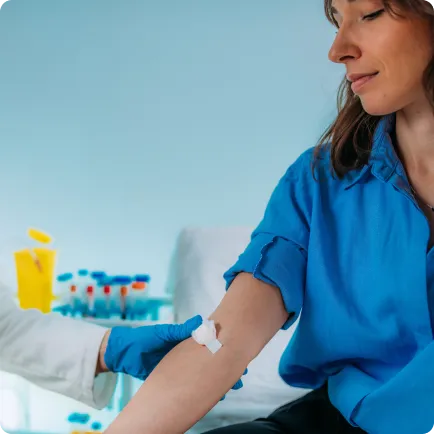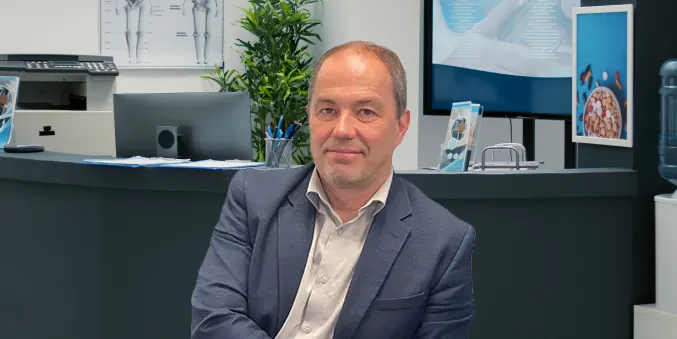Our goal is to offer lasting solutions that stand strong against the obstacles you encounter. Prioritizing durability while providing immediate relief, we are dedicated to helping you reclaim control and embrace a brighter future.
Experience transformative Ketamine Therapy New Jersey with us today. Explore our range of ketamine therapy options below.

If you are seeking a powerful solution for your mental health struggle, look no further than ketamine therapy. Offering rapid relief and lasting results, Ketamine therapy has emerged as a groundbreaking practice for overcoming mental health challenges.
Depression can be debilitating, but with ketamine, a new sense of relief becomes available. From various forms of chronic depression to Major Depressive Disorder, postpartum depression, and acute anxiety, ketamine therapy offers hope. Benefits include:
Ketamine therapy, the only legal psychedelic medicine, acts as a dissociative anaesthetic, offering profound relief from emotional suffering. By stimulating the production of glutamate, a natural brain chemical often imbalanced in depression, ketamine-assisted therapy can break through where other medications fall short.


Racemic ketamine, which is administered intravenously, goes directly to the patient’s bloodstream.
IV infusions provide a reliable and efficient method for administering this treatment, ensuring rapid absorption and effectiveness.
A quick-working nasal spray, offering quick relief of depression. It is an option that is typically covered by insurance.
These injections are delivered into the thick muscles of your arm, thigh, hip, or buttocks.

With a 25-year career as a psychiatrist, I have studied under influential experts in New York and Boston, delving into inpatient and outpatient care, research, and student supervision. Modern neuroscience guides me in addressing countless parent-child issues. Being part of this movement and sharing knowledge is a privilege. Having worked in esteemed institutions like Beth Israel at Mount Sinai, Tufts Medical Center, and Rutgers, I offer top-tier care, enriched by current research, while my passion lies in aiding those in need.
of patients report improvements in depression and anxiety within 4 weeks.
“This is a game changer,” says John Krystal, MD, chief psychiatrist at the clinical practice for Yale School of Medicine and one of the pioneers of ketamine research in the country. The drug works differently than those used previously, he notes, calling ketamine the “anti-medication” medication, and emphasizes that, “with most medications, like valium, the anti-anxiety effect you get only lasts when it is in your system. When the valium goes away, you can get rebound anxiety. When you take ketamine, it triggers reactions in your cortex that enable brain connections to regrow. It is the reaction to ketamine, not the presence of ketamine in the body, that constitutes its effects.”
While the FDA continues its comprehensive evaluation of ketamine’s potential applications, a substantial body of scientific research consistently highlights the numerous and often profound advantages of this medication. Short-term and long-term studies have demonstrated rapid therapeutic responses, reduced relapse rates, and good safety results associated with ketamine treatments, including intranasal administration. Alternative administration routes, such as intravenous and subcutaneous delivery, show promising potential.
Read more about ketamine therapy on our blog:
Exploring Ketamine Therapy with Neuroplasticity MD in New Jersey
Ketamine vs. TMS for Depression in NJ: An In-Depth Comparison to Help You Choose the Right Treatment
The FDA has taken steps to ensure patient safety in light of the transient adverse effects associated with ketamine. The Spravato® Risk Evaluation and Mitigation Strategy (REMS) sets forth a treatment guidance to use intranasal ketamine only under direct medical supervision. This approach guarantees secure delivery and safety. Patients are closely observed for a minimum of two hours following each session. It’s worth noting that even when adverse effects do occur, they will likely diminish within two hours.
A standard intranasal ketamine regimen typically involves two doses per week over four weeks, followed by one or two doses per week based on patient response. After nine weeks, dosing intervals transition to weekly or bi-weekly sessions, aimed at maintaining remission from depressive symptoms while using the lowest effective dose.
The hallmark of ketamine treatment is its ability to provide rapid relief, with many patients reporting a decrease in depressive symptoms and even suicidal thoughts within just 2 to 4 hours after treatment. Research demonstrates that the majority of patients experience a dramatic reduction in depressive symptoms in just over two months, with a substantial rate of long-term improvement.
Ketamine therapy for depression operates by acting on the brain’s neurotransmitter systems distinctively. Unlike traditional antidepressants that often require weeks to take effect, ketamine provides rapid relief. It triggers reactions in the cortex, promoting the regrowth of brain connections. This unique mechanism facilitates the alleviation of depressive symptoms and offers a swift therapeutic response, typically within hours of treatment. Ketamine’s effectiveness extends to various mental health issues, including severe depression, bipolar disorder, postpartum depression, and acute anxiety. Its capacity to induce rapid results and its distinct mode of action make ketamine a game-changing approach in the realm of depression treatment.
Traditional antidepressants modulate the brain’s monoamine systems, affecting serotonin and norepinephrine regulation. However, individuals with treatment-resistant depression often exhibit minimal or no response to these monoamine-focused medications. In contrast, ketamine targets the glutamate system, including NMDA receptors, which could be pivotal in addressing depression and suicidal ideation in non-responsive cases.
Ketamine’s rapid onset sets it apart from traditional antidepressants, which usually take six to eight weeks for full effectiveness. For those facing severe depression or imminent self-harm, waiting months for symptom relief is not feasible. Ketamine offers swift, potentially life-saving relief, especially for severe suicidal ideation or behavior.
Unlike traditional antidepressants, ketamine boasts a more favorable long-term side effect profile. Approximately 10-15% of antidepressant users discontinue treatment due to adverse effects, including nausea, fatigue, weight gain, sexual dysfunction, and insomnia. Although jetamine prompts immediate nervous system effects, they dissipate shortly after treatment and are generally well-tolerated. While the extended treatment’s enduring effects are uncertain, they may still prove preferable to the drawbacks of traditional antidepressant side effects.
Absolutely, ketamine therapy is generally safe when administered with proper medical supervision. It has been used for a long time as an aesthetic in medical settings. When used for mental health treatment like depression, anxiety, and PTSD, medical experts closely watch how it’s given and how the patient reacts.
During the treatment, the doses of ketamine are controlled and the patient is watched closely. The side effects of ketamine are usually not too strong and don’t last long. They might include feelings of being disconnected, dizziness, or feeling sick to the stomach. These effects usually go away soon after the treatment.
It’s vitally important to engage in ketamine therapy with doctors trained in this form of treatment. They’ll look at your medical history, adjust the treatment to fit you, and discuss any concerns you have. With qualified healthcare professionals, ketamine is considered safe and effective when used as indicated.
No, there is no evidence to suggest that ketamine infusions, when administered at the low doses and frequencies typically used to treat mood disorders, lead to dependence or addiction. In fact, some research even indicates that ketamine can be a beneficial treatment for overcoming addiction. If you have a history of substance abuse, please don’t hesitate to inform us during your assessment. This information is important for us to ensure your safety and provide you with the most effective care.
Immediately following a ketamine session, side effects are typically mild and brief, lasting only an hour or so. These may encompass slight drowsiness, occasional nausea, or a temporary rise in blood pressure.
Throughout the infusion, we diligently monitor your vital signs and provide anti-nausea medication as needed to ensure your comfort. Less frequently, some individuals may encounter vivid dreams or agitation, but such effects can be managed by adjusting the dosage.
It’s worth noting that many patients actually appreciate the relaxed and liberating sensation they experience during the infusion, which has been suggested to have potential therapeutic benefits.
At Neuroplasticity MD clinic, we believe in maximizing the therapeutic benefits of your ketamine treatment. That’s why, as part of our advanced ketamine treatment protocol, we provide Integration Sessions alongside each ketamine infusion session.
Here’s how it works: Following your ketamine medicine session, you’ll have a 45-minute Integration Session scheduled with a psychotherapist right after your session. The goal is to help you transform key insights gained during your ketamine therapy into long-lasting healing and personal growth.
These integration sessions can be valuable not only for patients continuing therapy at the Neuroplasticity MD clinic but also for those seeking extended therapeutic support elsewhere. We respect and support these ongoing therapeutic relationships, recognizing their importance in maintaining the progress made during treatment.
Our integration sessions are designed to enhance your treatment outcomes by focusing on three primary strategies:
These sessions are a vital part of our commitment to your overall well-being and growth.
Many insurance companies, along with Medicare, typically exclude coverage for infusion ketamine therapy but do cover intranasal ketamine (Sparavato).
No. To ensure your safety, we kindly request that you arrange for a designated driver to accompany you to the procedure. We also advise refraining from operating heavy machinery for 24 hours starting from the time of your treatment.
Happiness is a journey, not a destination. Learn how a
personalized treatment approach may help you break free and create a tomorrow full of infinite possibilities.
Our united team offers personalized care rooted in cutting-edge knowledge and unwavering compassion. With diverse backgrounds and specialties, we address a range of mental health concerns, guiding you to relief and growth.
Empowerment, resilience, and personalized attention define our approach. We are here to support you every step of the way, creating a safe space for exploration. Choose us for skilled, empathetic care. Your well-being matters and our team is committed to your success.

Take this next step, we’ll help with the others.
440 West Street, Suite 318 Fort Lee, NJ 07024
Office 94 valley Rd , Montclair , NJ 07042
440 West Street, Suite 318 Fort Lee, NJ 07024
Office 94 valley Rd , Montclair , NJ 07042
Disclaimer: The medical information on this site is provided as an information resource only, and is not to be used or relied on for any diagnostic or treatment purposes. This information is not intended to be patient education, does not create any patient-physician relationship, and should not be used as a substitute for professional diagnosis and treatment. Always consult your healthcare provider before making any healthcare decisions or for guidance about a specific medical condition.